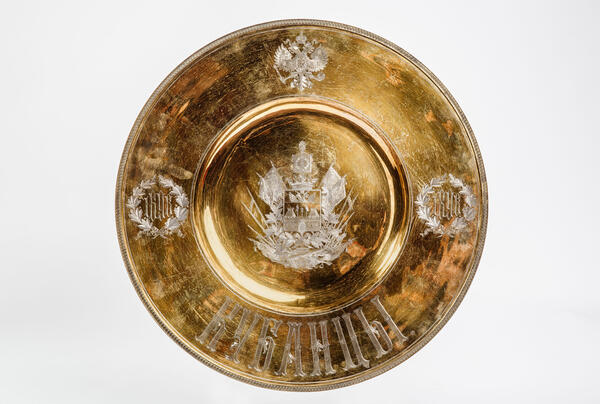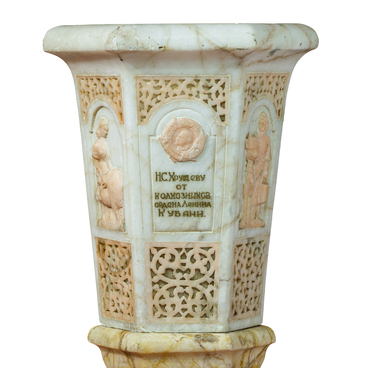The regalia collection of the Kuban Cossack Host began at the end of the 18th century. It contained silver artwork, including several dishes with gilding. One of them is a round gilded dish with the engraving ‘Kubanians. 1696–1896’. In addition to this inscription, it is decorated with the coats of arms of the Russian Empire and the Kuban region.
The engraving indicates that the dish was commissioned by the Kuban Cossack Host. Historians claimed that the dish was designed for the traditional welcome offer of ‘bread and salt’ to high-ranking guests. This version was confirmed by the documents from the State Archive of Krasnodar Krai.
In 1896, the Kuban Cossack Host celebrated its bicentennial anniversary. A special commission of 12 people organized the celebration — they approved the guest list and the program of events. On September 8, official celebrations took place, and were attended by active and retired officers of the Cossack Host, distinguished guests, including members of the Imperial family and representatives of all stanitsas (stanitsa is a village or administrative district in the Cossack regions of Russia). The Cossacks from combat maneuver units organized celebrations in summer camps. On the day after, September 9, everyone could take part in the celebrations, but it was necessary to buy an entrance ticket.
Adjutant General Sergei Alekseevich Sheremetev, commander of the troops of the Caucasus Military District and the appointed ataman of the Kuban Cossack Host, was invited to the anniversary celebrations. Sheremetev was greatly respected among the Cossacks, a street in Ekaterinodar (today Krasnodar) was even named in his honor. The gilded dish with commemorative inscriptions was made for him. However, the general was unable to come to Ekaterinodar: he fell seriously ill and died soon.
The expensive dish, which the Cossacks were unable to give to Sheremetev, was kept in the office of the head of the Kuban region, the appointed ataman Yakov Malama. On October 9, 1896, the ‘unsuccessful’ gift was handed over for storage to the Military Assembly ‘until a special order’. And in 1902, the dish first appeared in the inventory of regalia with the wording ‘purchased for the anniversary day, for a gift, but not presented’.
The engraving indicates that the dish was commissioned by the Kuban Cossack Host. Historians claimed that the dish was designed for the traditional welcome offer of ‘bread and salt’ to high-ranking guests. This version was confirmed by the documents from the State Archive of Krasnodar Krai.
In 1896, the Kuban Cossack Host celebrated its bicentennial anniversary. A special commission of 12 people organized the celebration — they approved the guest list and the program of events. On September 8, official celebrations took place, and were attended by active and retired officers of the Cossack Host, distinguished guests, including members of the Imperial family and representatives of all stanitsas (stanitsa is a village or administrative district in the Cossack regions of Russia). The Cossacks from combat maneuver units organized celebrations in summer camps. On the day after, September 9, everyone could take part in the celebrations, but it was necessary to buy an entrance ticket.
Adjutant General Sergei Alekseevich Sheremetev, commander of the troops of the Caucasus Military District and the appointed ataman of the Kuban Cossack Host, was invited to the anniversary celebrations. Sheremetev was greatly respected among the Cossacks, a street in Ekaterinodar (today Krasnodar) was even named in his honor. The gilded dish with commemorative inscriptions was made for him. However, the general was unable to come to Ekaterinodar: he fell seriously ill and died soon.
The expensive dish, which the Cossacks were unable to give to Sheremetev, was kept in the office of the head of the Kuban region, the appointed ataman Yakov Malama. On October 9, 1896, the ‘unsuccessful’ gift was handed over for storage to the Military Assembly ‘until a special order’. And in 1902, the dish first appeared in the inventory of regalia with the wording ‘purchased for the anniversary day, for a gift, but not presented’.


